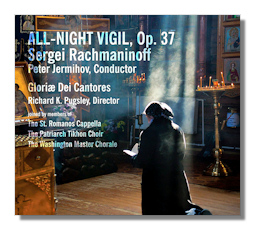
The Internet's Premier Classical Music Source
Related Links
- Rachmaninoff Reviews
- Latest Reviews
- More Reviews
-
By Composer
-
Collections
DVD & Blu-ray
Books
Concert Reviews
Articles/Interviews
Software
Audio
Search Amazon
Recommended Links
Site News
 CD Review
CD Review
Serge Rachmaninoff

All Night Vigil
Mariya Berezovska, alto
Dmitry Ivanchenko, tenor
Vadim Gan, clergy exclamations
Dmitry Ivanchenko, clergy exclamations
Gloria Dei Cantores with members of:
The Romanos Capella/Richard K. Pugsley
The Patriarch Tikhon Choir
The Washington Master Chorale/Peter Jermihov
Gloria Dei Cantores SACD GDCD063 66:34
Rachmaninov's All Night Vigil is an extraordinarily beautiful work, as those familiar with it are certainly aware. Thus, it is no surprise that it has, especially in recent times, been heavily recorded. Surprisingly, it got off to a very slow start, its first recording coming only in 1965, a half century after it was written! Ironically, it was the Soviet label, Melodiya, that made that initial recording which was led by Alexander Sveshnikov. Some ask, is All Night Vigil a truly sacred work, or is it in a kind of limbo like Verdi's Requiem, which many have argued is a sort a quasi-religious composition of great dramatic sweep and emotional power? There are those who have called Verdi's effort more operatic than sacred. Well, the Rachmaninov All Night Vigil is indeed the real thing, but it can be, and is, performed as a concert work and undoubtedly enjoyed by atheists and agnostics, as well as believers.
Rachmaninov was a member of the Russian Orthodox Church, though it is pretty widely accepted that he was not among its most devoted adherents. It is not known precisely what may have been the springboard of his inspiration for All Night Vigil, but it almost certainly relates in some way to the work's dedicatee, Stepan Smolensky (1848-1909), a Russian chant scholar and choir director, who instructed Rachmaninov in ancient Russian chant. For this work, completed in 1915, Rachmaninov decided to set what he regarded as the most important hymns and canticles from the two services, Vespers and Matins, which form one service – the All Night Vigil. Of the fifteen numbers comprising the work, Rachmaninov used his own melodies in Nos. 1, 3, 6, 10 and 11. In the others he employed thematic material from ancient chant, not merely harmonizing the music, but typically injecting his own unique voice in the main lines.
#2, Bless the Lord, My Soul, is one of the most beautiful hymns here and it is sung gorgeously by the combined choral forces and the alto soloist Mariya Berezovska. The music is at once rather dark, yet consoling and uplifting as well, taking the listener straight up to the heavens. But then, so much else here is moving in its ravishing yet subtle beauty: try #5, Now Lettest Thou, where again the choir is utterly angelic and the tenor soloist, Dmitry Ivanchenko, enthralling. He and the choir are also splendid in the climactic #9, Blessed Art Thou, Lord.
While #6, Rejoice Virgin, features Rachmaninov's own melodic material, as well as characteristics of ancient chant styles, the music also exudes a very Russian, almost folk-like character in places, most notably in the faster music. It is a very haunting piece and beautifully sung once again by the choir. Certainly much of the credit for the success of the singing throughout the work must go to American conductor Peter Jermihov, who consistently draws fine performances from the soloists and the wonderful Gloria Dei Cantores Choir, as well as members from the other three fine ensembles – the Romanos Capella, Patriarch Tikhon Choir, and Washington Master Chorale. Jermihov employs moderate tempos for the most part and achieves excellent balances from his singers, while always managing to point up significant detail – detail lesser conductors overlook or fail to bring into proper perspective.
In longer hymns like #11, My Soul Magnifies the Lord, Jermihov never allows the music to bog down, managing to impart a vital sense to the to the flow of the singing, despite the seemingly ponderous character of much of the music and its generally slow tempos. Again, the choir sings beautifully and with spirit. In many ways here is another hymn where the music may sound dark at times and almost foreboding but ultimately comes across with an uplifting character of mesmerizing beauty.
The sound reproduction on this SACD is very good, though I wish it had a bit more of a closeup perspective. The album notes, by Maestro Jermihov, are very copious and detailed, offering much insight into the circumstances surrounding this work and the composer's mindset when he wrote it. Full texts are also provided as well as biographies of performers. Among other recordings of this work, the recent Charles Bruffy-led effort on Chandos has received nearly unanimous high praise, but unfortunately I have not heard it. Its timing is much slower than Jermihov's and I'm not sure such apparently expansive tempos would appeal to my somewhat driven spirit. Thus, I feel fully confident in giving this splendid Gloria Dei Cantores recording a very strong recommendation.
Copyright © 2017, Robert Cummings


















